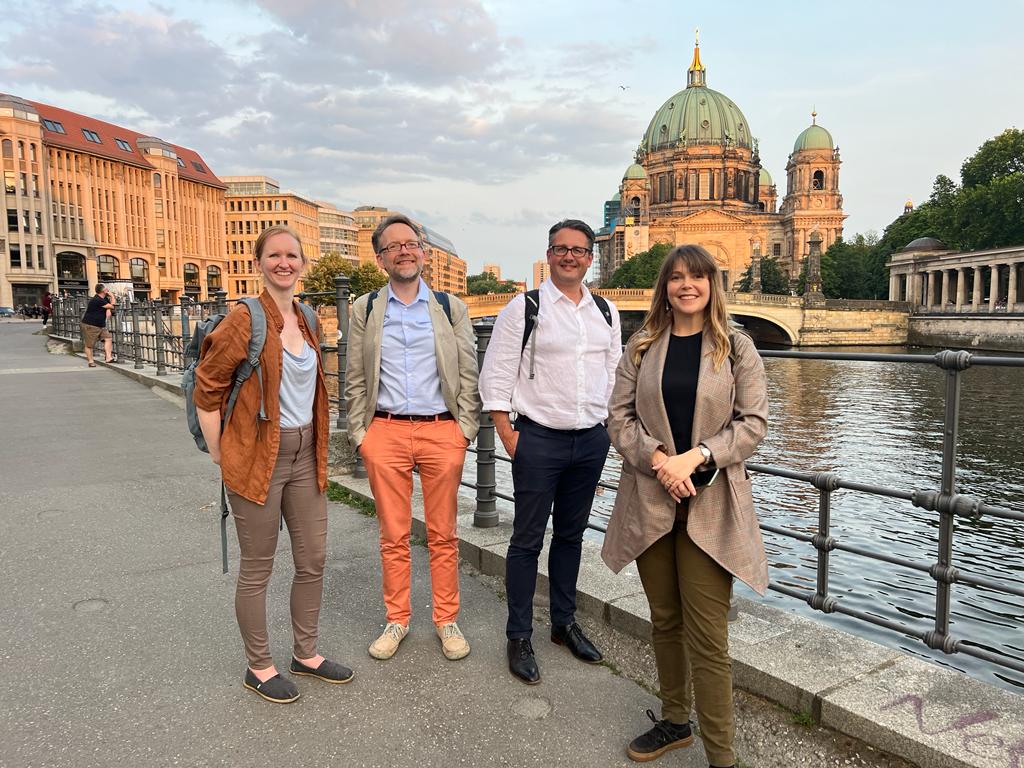From July 3-5 2023, the Sound of Nature project team met in Berlin for knowledge exchange and to officially launch and present the project to the (academic) public.
The event took place on July 4 at Humboldt university and was opened in German and English language by Dr. Wilko Graf von Hardenberg and Professor Martin Willis, who in his subsequent introductory talk gave a brief overview of the project’s research interests and objectives.
The beginning was made by Dr. James Castell, who presented William Wordsworth’s Startling Sounds to the audience. Dr. Castell’s paper was focussed on how listening to neglected sounds in Wordsworth’s poetry might have unexpected consequences, both as keynote sounds and perhaps most especially within a multi-layered soundscape. His readings emphasised how sounds are entangled with each other in Wordsworth’s verse as well as with the physical and textural spaces in which they reverberate. Such entanglement should have salutary consequences for the forms of environmental awareness that Wordsworth’s poetry is often seen to have inspired.
Dr. Francesca Mackenney’s paper The Butter Bump: Wetlands Sounds and Aesthetics explored the strange sounds and antics of wetland birds in the mating season: the booming of the bittern, the drumming of the snipe and the ‘peewit’ of the lapwing. Like so many other things about fens, bogs and swamps, these peculiar mating rituals may tell us something about the evolutionary origins of our ‘sense of the beautiful’, as well as how important aesthetic tastes have proved in determining what is valuable – and therefore worth conserving – in the natural world.
Anne Hehl, PhD student in the project, briefly presented the topic of her doctoral thesis that deals with Literary Soundscapes in 19th Century Popular Science Books, in which she explores nature sounds in popular scientific texts of the 2nd half of the 19th century. Mostly represented in popular natural scientific books on native birds and local nature that were meant to educate and sensitise a non-scientific audience, sound descriptions are used to create lively narrations of natural spaces and emotionally involve the readers. Furthermore, sound descriptions metaphorically connect not only various life forms, but also the physical world and the transcendental. Consequently, research on sounds in popular science texts is important for understanding how ‘environmental’ knowledge was communicated to a non-scientific audience through sound and how it shaped popular notions of animals, nature, and the environment.
The last talk The Sound of Conservation: An Environmental History, which discussed the chronologically most recent sources, was held by Dr. Wilko Graf von Hardenberg. He pointed out that most of the histories of the conservation movement highlight the importance of visual aspects in its development. Hence, one of Dr. Hardenberg’s project aims is to go beyond this narrative and explore the place sound had in calls for the need to preserve the natural world and how, in respect to the visual, the aural brought to the forefront what later would have been called ecosystemic aspects. However, while visual aesthetics of a landscape are easily perceived by anybody, knowledge is central to the possibility to fully appreciate a soundscape. Another recurring issue in the early German conservation debate and question that he will address during the project is the managing of the presence of unruly and noisy humans in the natural world.
The presentations were followed by a lively discussion on representations of nature sounds in the past and presence in the fields of e.g. psychology, media, literature and culture science and nature conservation. After this wonderful and inspiring event, the team continues its research on nature sounds with new impressions and perspectives.


